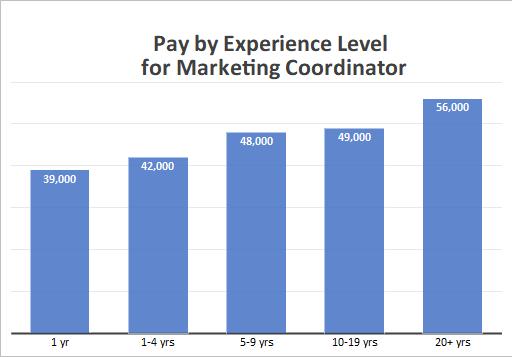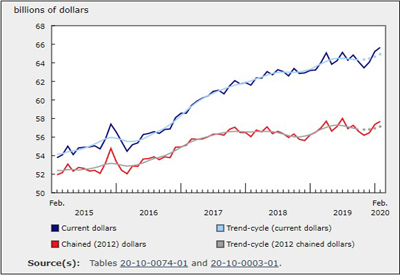How Are Electrical Distributors Using Social Media?

Apr 1, 2019
By Katrina Olson
As a marketing consultant for electrical distributors, manufacturers, and associations and a marketing competition judge, I’m often asked to comment or speak on a number of marketing topics. Sometimes, I’m asked very specific questions I wish I could more accurately answer. For example, on the topic of social media, I’ve been asked, “What platforms are most distributors using? How often do they post on those platforms? How well is social media working for them? Which platforms are most effective?”
I share my general impressions, but I’d rather be able to share some hard data. I read. I research. And while it’s easy to find “big picture” research about social media, finding current information specific to electrical distribution is nearly (if not totally) impossible.
That’s why, in January and February, with support from LEDVANCE, Katrina Olson Marketing + Training (yes, that’s me) surveyed a representative sample of more than 50 electrical distributor marketers throughout North America.
About 46% of respondents were director level or above and 27% were managers. About 27% were from companies with annual revenue less than $50 million (all figures in U.S. dollars); another 23% of were from companies with annual revenues between $50 and $100 million; the remaining 50% had revenues of $100 million or more. A more detailed breakdown is in the full report available at katrinaolson.com/research.
As it turns out, distributors are quite varied in their social media use. Here are the highlights.
• Nearly 90% of distributors already use social media or plan to in 2019; the remaining 10% don’t use it and don’t plan to do so.
• In 2019, nearly 77% of respondents will increase social media activity.
• LinkedIn, Facebook, and Twitter were the most used platforms; LinkedIn was considered most effective and YouTube second most effective.
• Overall, respondents felt social media was “moderately” successful at achieving several goals (details later), but “very” or “extremely” successful at increasing exposure and improving search rankings.
• The majority of distributors posted content related to their company’s products, service, events, and promotions; while about half reported sharing content from other sources or informational/educational content.
That’s where we are now. But let’s put these numbers into perspective by comparing them to some related and comparable studies.
Comparison to previous studies
Not surprisingly, social media use has grown exponentially in recent years. Let’s compare the results of this 2019 survey with data from a 2012 survey by the National Association of Electrical Distributors (NAED).
1. Facebook. In 2019, 67% of distributors responding reported posting on Facebook daily or weekly. In NAED’s 2012 survey, only 34% of respondents were actively using Facebook on behalf of their company. 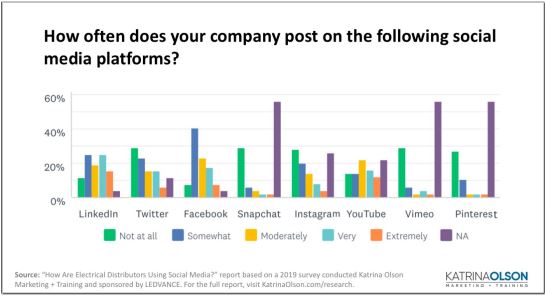
2. Twitter: An estimated 63% of electrical distributors are tweeting daily or weekly on behalf of their company. According to the 2012 NAED report, only 28% of distributors were “actively using” Twitter.
3. LinkedIn: In 2019, 60% of respondents reported posting on LinkedIn daily or weekly. In the 2012, only 25% of distributors reported “actively using” their company LinkedIn account.
4. YouTube: In 2019, just over 31% of distributors said they posted videos monthly; but just over 6% posted content daily or weekly. This may be due to the time and effort involved in producing videos versus the ease of posting on other platforms. Seven years ago, only 15% of respondents “actively used” YouTube.
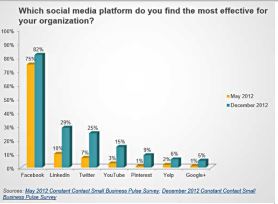
Clearly, distributors are posting more than they did seven years ago. But has that increase in activity been accompanied by an increase in effectiveness?
Measures of effectiveness
In 2012, Constant Contact surveyed small business owners in both May and December. One question asked was, “Which social media platforms do you find most effective for your organization?” Both times, the most effective platforms were (from most to least): Facebook, LinkedIn, Twitter, and YouTube with Pinterest and Yelp lagging behind.
Distributors who responded to the 2019 survey cited LinkedIn, YouTube, Facebook, and Twitter as the most effective platforms, in that order. Nearly 60% of respondents found LinkedIn “moderately” to “extremely” effective; that number was 50% for YouTube, 48% for Facebook, and 36.5% for Twitter.
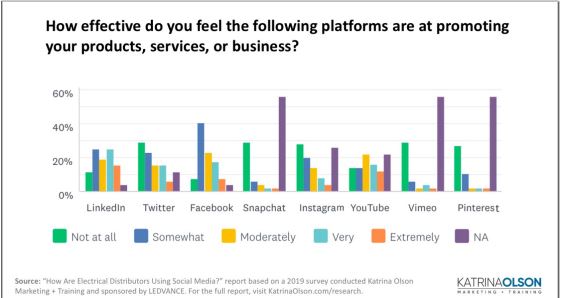
Part of social media’s effectiveness is its ability to achieve
goals and objectives. A 2014 study of 115 B2B marketing specialists by business agency Omobono found that social media was more effective at achieving goals related to soft measures like brand awareness and thought leadership than hard measures like lead generation.
But social media measurement has become more sophisticated. Platforms, applications, and marketers themselves are better able to achieve and measure success, especially with what are traditionally considered hard measures. 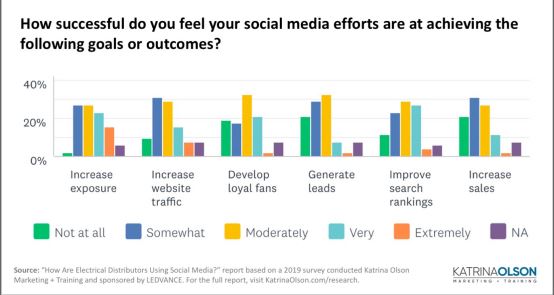
Approximately 30% of respondents to the 2019 survey felt their companies’ social media efforts were “moderately” successful across all goals, but a combined 38.5% cited feeling “very” or “extremely” successful at increasing exposure, and 30.8% felt their social media efforts were “very” or “extremely” successful at improving search rankings.
Why does social media matter?
Social media has a positive influence on most companies’ revenue and sales, according to more than half of respondents to a 2017 social media survey of 344 social media marketers by D.C.-based research firm Clutch. And it has become a necessary marketing tool as Generation X (now age 40-54) takes on corporate leadership roles and Millennials (now age 25-39) enter the workforce and move up the ranks, gaining more decision-making power.
Navigating the marketing landscape requires a foundational level of social, digital, and data literacy that is becoming non-negotiable. Marketing personnel must continue to develop new skills while transitioning from traditional strategies and tactics to current social and digital, data-based technologies.
Company leadership can support marketing by embracing technology; staffing for digital marketing; providing opportunities for education, training, and coaching; enabling marketers to practice what they’re learning; and working with marketing staff to establish realistic metrics for evaluating the impact of their efforts.
To see the full report, visit KatrinaOlson.com/research. If your company is interested in sponsoring a future research project on another topic, please contact Katrina at Katrina@KatrinaOlson.com.
Katrina Olson is a marketing consultant, trainer, speaker, columnist and content developer. She hosts the Market Boldly podcast available on iTunes, Google Play, and at KatrinaOlson.com. Katrina writes for tED magazine, lightEDmag.com, tedmag.com, The Current, and Hardwood Floors magazine, as well as content for several electrical distributor and manufacturer blogs and publications. She has judged tED magazine’s Best of the Best Competition since 2006 and spoken at several industry events for NAED, AD, Legrand and more. She can be reached at Katrina@KatrinaOlson.com or through her website at www/katrinaolson.com.



